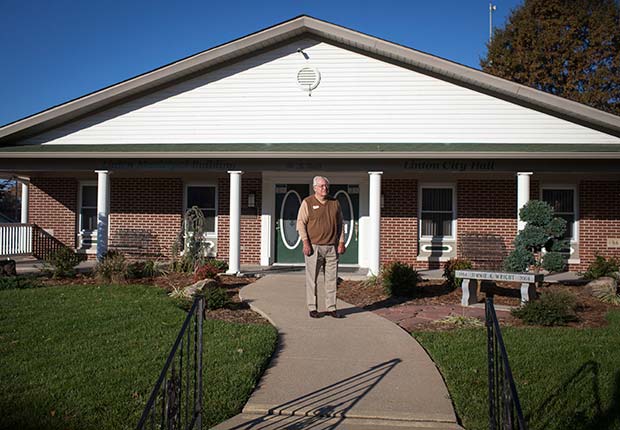AARP Hearing Center

By Jacqueline Thomas
Noble Stallons has always been active in his community. In recent years, that’s been Linton in southwestern Indiana, where he’s worked with the Indiana Commission on Aging and his region’s Area Agency on Aging.
“For 25 or 30 years, I’ve been an advocate for the elderly and people with different abilities,” said the 79-year-old retired utility executive. Since he left “the fast lane” of work, as he put it, that involvement has only grown.
The director of the aging agency suggested he check out AARP Indiana’s legislative team, and after attending an orientation, Stallons was sold on its possibilities.
The team is made up of about a dozen volunteers from around Indiana who converge on the State House twice a month during the General Assembly session, which begins in January.
Members are joined by Ambre Marr, AARP Indiana state legislative director, in briefing lawmakers to seek support for AARP-backed bills and to make them aware of issues that older adults and other Hoosiers “deal with, day in and day out,” according to Marr.
The legislative team has real impact, said AARP Indiana communications director Katie Moreau: “It’s impressive to watch our volunteers at work because they’re as—or more—effective than the professional lobbyists.”
In 2015, the two main priorities on the legislative agenda will be crafting a proposal to boost financial security for retirees and providing added support for family caregivers.
Nationally, nearly half of workers 50 or older have less than $25,000 in savings and investments, Marr said. About 1 million Indiana workers don’t have savings plans through their jobs.
“We need to do something now to get people to save more,” Marr said.
Legislation to set up a voluntary state-assisted retirement savings plan for private-sector workers failed to get a floor vote in the Senate last session, so AARP Indiana is working with other groups to agree on a bill for next year that will have broad support, she said.
The other top issue on the agenda is caregiving.
About 1.3 million Hoosiers provided unpaid care for loved ones in 2011, according to an AARP Public Policy Institute report. The value of that care has been placed at $9.4 billion, many times the total government spending on long-term care in the state.
Need for training
AARP Indiana is working on crafting a Caregiver Advise, Record, Enable (CARE) Act, which would help provide support and training for family caregivers so they can perform often-complex tasks needed when a relative returns home after being hospitalized.
The care and assistance that family caregivers provide—from managing medications and special diets to operating monitors and other specialized medical equipment—is critical to patient safety and to avoiding hospital readmission or costly institutional care.
AARP Indiana also supports a tax credit for home improvements or equipment needed to help provide for the well-being of a family member under care.
Because the overwhelming majority of Americans want to live independently as they age, Marr and the volunteers carefully monitor funding for in-home and community-based services for older adults, said Moreau.
In addition, the state organization closely tracks utility, budget, insurance and elder fraud issues, Marr said.
She is optimistic that there will be progress in the next General Assembly on AARP Indiana’s priorities. She points to the strength of the legislative team and the impact of seminars and other events, such as Caregiver Connections programs, sponsored by the state organization.
AARP Indiana is always looking for volunteers. If you’re interested in joining the legislative team or in other volunteer opportunities, email in@aarp.org or call 866-448-3618 toll-free.
Jacqueline Thomas is a writer living in Indianapolis.































































